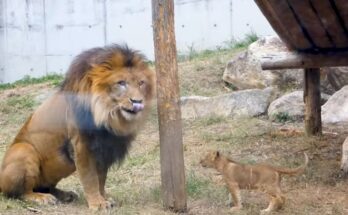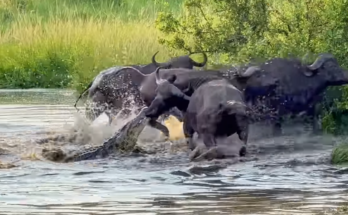
It was a quiet afternoon at a zoo in Japan, the kind where the air is filled with the distant chatter of visitors and the occasional cry of exotic birds. In the lion enclosure, a lioness named Sora paced restlessly. She was known for her sharp instincts and calm strength, but today something had changed.
A routine maintenance operation had taken a wrong turn. A temporary gate meant to separate areas of the enclosure hadn’t latched properly, and in the confusion, a small group of unfamiliar animals—a pair of young male lions recently introduced for breeding—entered Sora’s space without warning. She was cornered near the rocks, caught off-guard by the sudden intrusion.
The males, unfamiliar with Sora and testing their dominance, moved closer with low growls. The situation turned tense as zoo staff, watching from nearby cameras, scrambled to intervene. But before anyone could act, Sora did what lionesses have done for thousands of years—she protected herself.
With a fierce snarl, she stood her ground, swiping with precision and roaring with power. Her size and agility gave her an edge. She lashed out just enough to create space, darting between the younger lions with speed and strategy. One backed off, startled; the other hesitated just long enough for her to escape toward a secure area behind a service gate, which zookeepers had managed to open just in time.
The drama lasted only minutes but felt much longer. Once safe, Sora stood tall, her flanks heaving but her eyes steady. She had defended herself not with blind aggression, but with controlled strength. Later, staff would call her actions extraordinary—but to her, it was instinct. She was a lioness. Cornered, yes—but never defeated.


